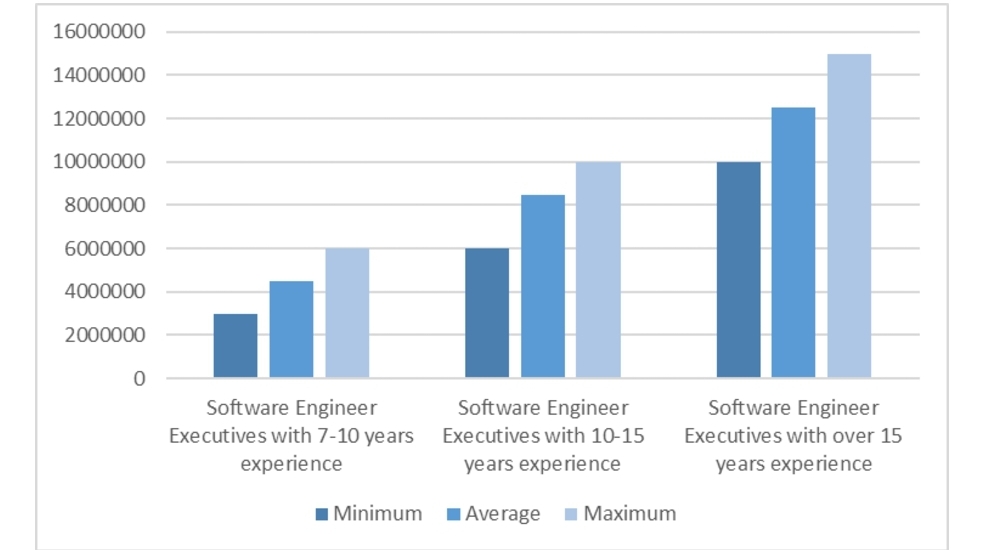 In Nigeria’s rapidly evolving tech sector, the significance of Software Engineering Executives has become increasingly evident. These executives, holding titles such as Head of Software Engineering, Chief Technology Officer, or Director of Engineering, play crucial roles in driving digital innovation and ensuring organizational competitiveness. Let’s examine the salary patterns for these top-tier executives across different experience levels in Nigeria in 2020.
In Nigeria’s rapidly evolving tech sector, the significance of Software Engineering Executives has become increasingly evident. These executives, holding titles such as Head of Software Engineering, Chief Technology Officer, or Director of Engineering, play crucial roles in driving digital innovation and ensuring organizational competitiveness. Let’s examine the salary patterns for these top-tier executives across different experience levels in Nigeria in 2020.
Impact of Nigeria’s Tech Advancement on Software Engineering Roles
Nigeria’s tech industry is witnessing remarkable growth, aligning with global digitization trends. Factors like improved internet accessibility, a burgeoning young population, and government support for technological advancement have created a fertile ground for tech innovation in Nigeria. In this context, the role of these Executives has gained prominence as companies seek to innovate and maintain their market edge.
Unveiling the Role of Software Engineering Executives
In Nigeria, these executives bear significant responsibilities, including strategic planning, maintenance, and enhancement of software portfolios. They collaborate closely with cross-functional teams, leading the conceptualization, development, and launch of software products tailored to meet market needs and drive business expansion. This role demands a blend of strategic foresight, technical proficiency, and effective team leadership.
Components of Software Engineering Executive Compensation in Nigeria
Base Salary:
The cornerstone of their compensation is the base salary, which varies based on factors like company size, industry, and the executive’s experience level. In Nigeria, executives with 7-10 years of experience typically earn between ₦3,000,000 to ₦6,000,000 annually. Those with 10-15 years of experience may command salaries ranging from ₦6,000,000 to ₦10,000,000 annually, while those with over 15 years of experience can earn between ₦10,000,000 to ₦15,000,000 annually.

(Graph Representation of Salary of Software Engineer Executives in 2020)
Bonuses and Incentives:
Performance-based bonuses and incentives tied to individual or team achievements are common in many companies, enhancing the overall compensation package for executives.
Equity Compensation:
In startup environments, these Executives may receive equity compensation, aligning their interests with the company’s growth trajectory. This practice is particularly prevalent in tech firms and can significantly boost overall earnings.
Remote Work Opportunities:
With the growing acceptance of remote work, Nigerian executives may explore opportunities with international firms, which may offer competitive salaries and additional benefits.
Factors Influencing Software Engineering Executive Compensation
Several factors influence compensation levels for Software Engineering Executives in Nigeria:
Experience and Specialization: Extensive experience and specialization in specific technical domains often result in higher earning potential for executives.
Job Title and Organizational Structure: The specific job title and organizational hierarchy impact compensation levels, with higher-ranking positions typically commanding greater responsibility and higher salaries.
Industry Demand: Industries experiencing high demand for innovative software solutions, such as technology, fintech, and e-commerce, often offer competitive compensation to attract top talent.
Educational Background: Executives with advanced degrees or specialized certifications tend to command higher salaries, emphasizing the importance of continuous learning and staying abreast of industry trends.
Geographical Location: Compensation levels may vary based on the geographical location of the employer, with executives in major business hubs like Lagos or Abuja typically receiving higher salaries compared to those in smaller cities.
Future Outlook for Software Engineering Executives in Nigeria
As Nigeria continues its digital transformation journey, the demand for skilled Software Engineering Executives is expected to rise. This increasing demand is projected to drive competitive salaries, making the field more attractive for individuals pursuing careers in software engineering. The salary landscape underscores the pivotal role of these executives in driving technological innovation and fostering business growth in Nigeria. With their strategic foresight and technical expertise, these Executives are poised to shape the future of Nigeria’s tech landscape.






